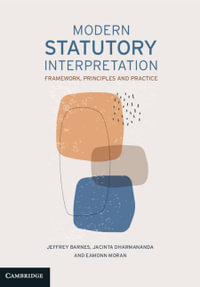Law, Person, and Community: Theological, Philosophical and Comparative Perspectives on Canon Law explores the understanding of the human person that underpins canon law. From theological, philosophical, and comparative perspectives, the book poses the question: "What is law?" The book presents canon law as a classical legal system in which the positive law is derived from natural and divine law. The classical approach to law rests upon an understanding of human nature in which reason is able to know first principles and universal goods. The book indicates that the classical understanding contrasts with the modern positivistic theory of law in which the parameters of human reason are limited by the need for empirical verification. In the classical approach, law also reflects the supernatural destiny of the human person. This supernatural end leads to the priority of the contemplative over the political in the design of positive law. In comparison, liberal theory favors a political conception of justice and the human person. Although the classical approach to law recognizes universal norms, it remains open to the historically contingent. As illustrative of its historical development, canon law affirms the right of religious freedom on the basis of the traditional Western doctrines of the dignity of the human person and the separation of church and state. Religious freedom is understood not only as the freedom of individual belief but freedom for the religious community to prosper through the practice of its faith in the pluralistic society. The book suggests that the classical approach to law with its ground in natural and supernatural truth affords a more firm foundation for the development of human rights than does the modern positivistic theory of law. The book further describes the classical role of law in setting the optimal conditions for human flourishing through membership, participation, and solidarity in community. Canon law fulfills this function for the religious community of the Catholic Church. The book juxtaposes canon law's view of religious freedom with that of the modern secular state in which religious freedom has been reduced to a matter of private belief. Employing the example of United States constitutional law, the book describes how the modern secular state has curtailed the function of law in fostering the freedom of the religious community in the public order. The book observes that the modern view is at odds with religious traditions such as Judaism, Catholicism, and Islam in which the practice of faith depends on the proper relation between law, person, and community. The book thus proffers that canon law serve as a dialog partner in the broader discussion about what is law.
Industry Reviews
"John J. Coughlin's book, Law, Person, and Community: Theological, Philosophical, and Comparative Perspectives on Canon Law, is a breath of fresh air in the positivistic polluted atmosphere of the Western legal systems. His approach, instead of following the rule: 'whatever the Queen in Parliament enacts is law', which often has been concretized in legislation contrary to the 'Creator's operating manual', opens a path to a better understanding of human ecology
and recognition that human nature needs to be better understood and respected in legislation."
--Ernest Caparros, Visiting Professor,
Pontifical University of the Holy Cross (Rome, Italy)
"A notably significant contribution to a better understanding both of human law in general and of the special character of a religious law that, by its insight into the nature and destiny of human persons and into the community established to bring these persons to eternal life, differs profoundly from the laws held out by religions earlier and later than Catholicism."
--John Finnis, Professor of Law & Legal Philosophy Emeritus
University of Oxford
"John Coughlin's book should be required reading not only in civil [secular] and canon law schools but also in theological institutions. His understanding and elucidation of canon law as both an ordinance of reason and an ordinance of faith has important implications not only for specifically theological disciplines - e.g., ecclesiology, Christology, systematic theology, and Christian anthropology - but also for understanding both canon and civil law and each
discipline's origin and application. Law, Person, & Community provides the necessary foundation to approach a variety of issues much to the fore in contemporary legal debate: the role of law in civil
society and in the Catholic Church; the intentionality of both civil and canon law; and the interaction between civil and canon law. These issues in turn permit a logical and intelligent discussion on the essential question of human rights - their origin and teleology."
--Robert J. Kaslyn, SJ, Dean, School of Canon Law, Catholic Unive
























